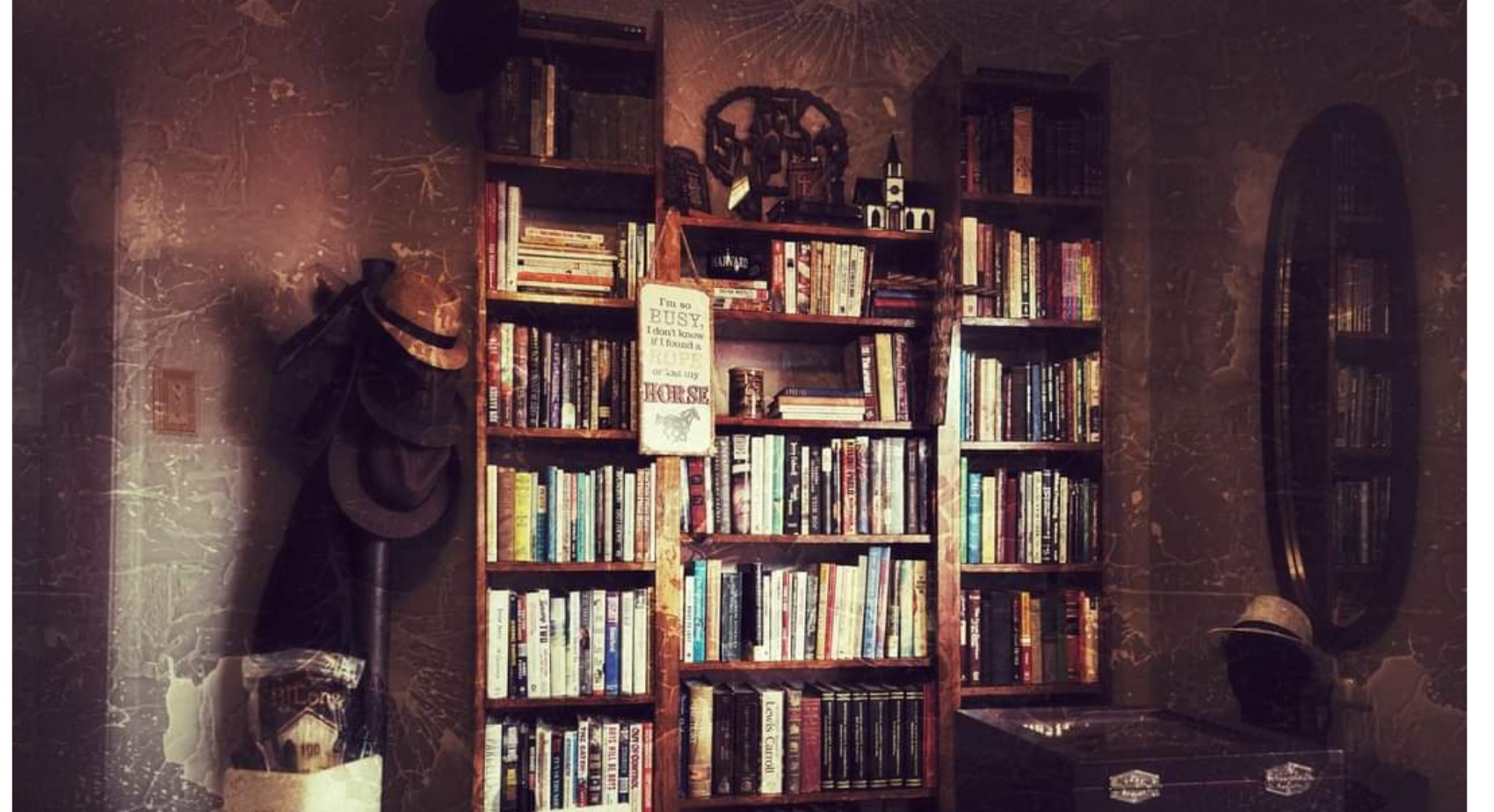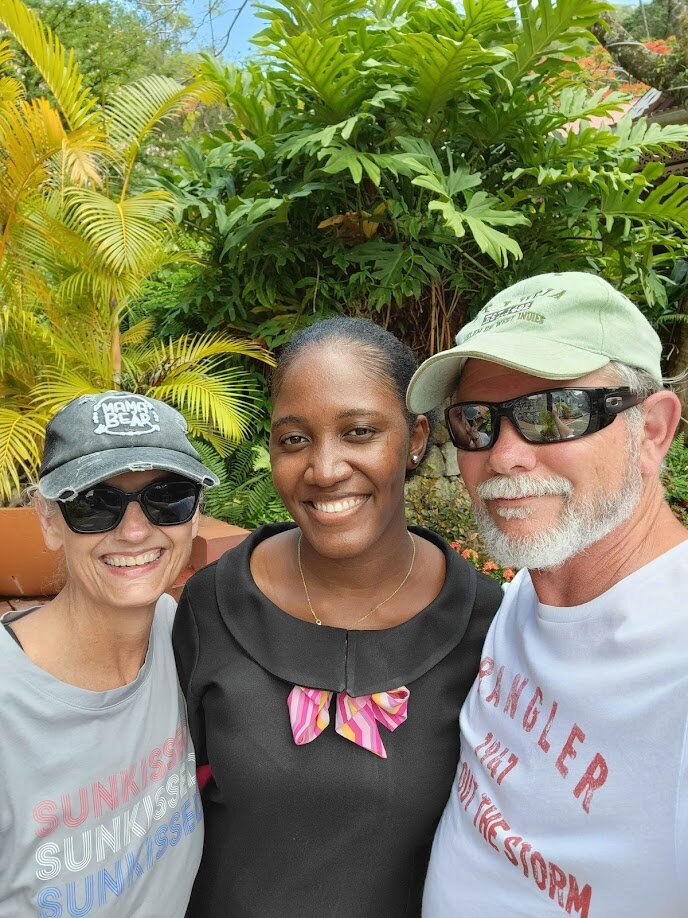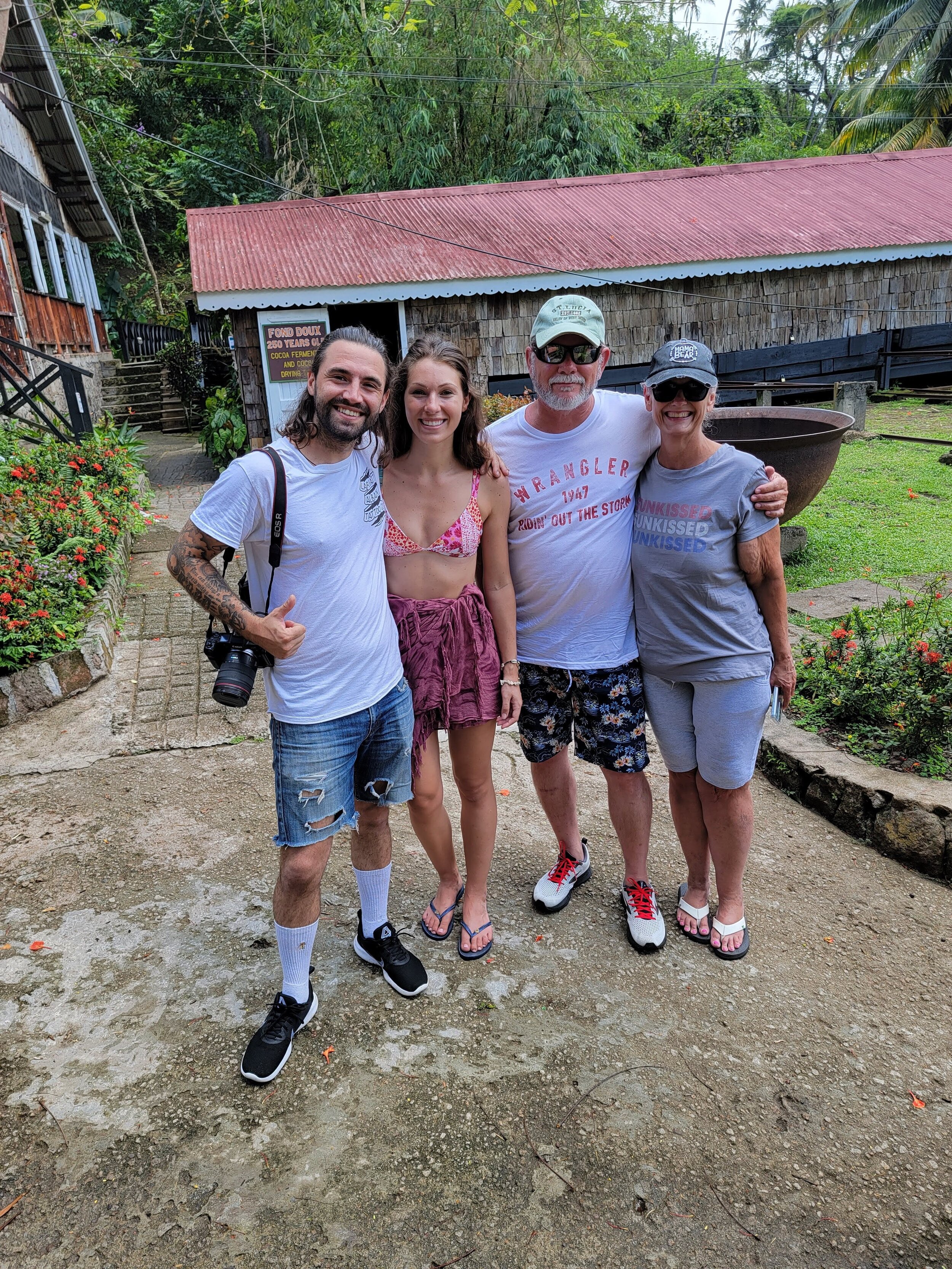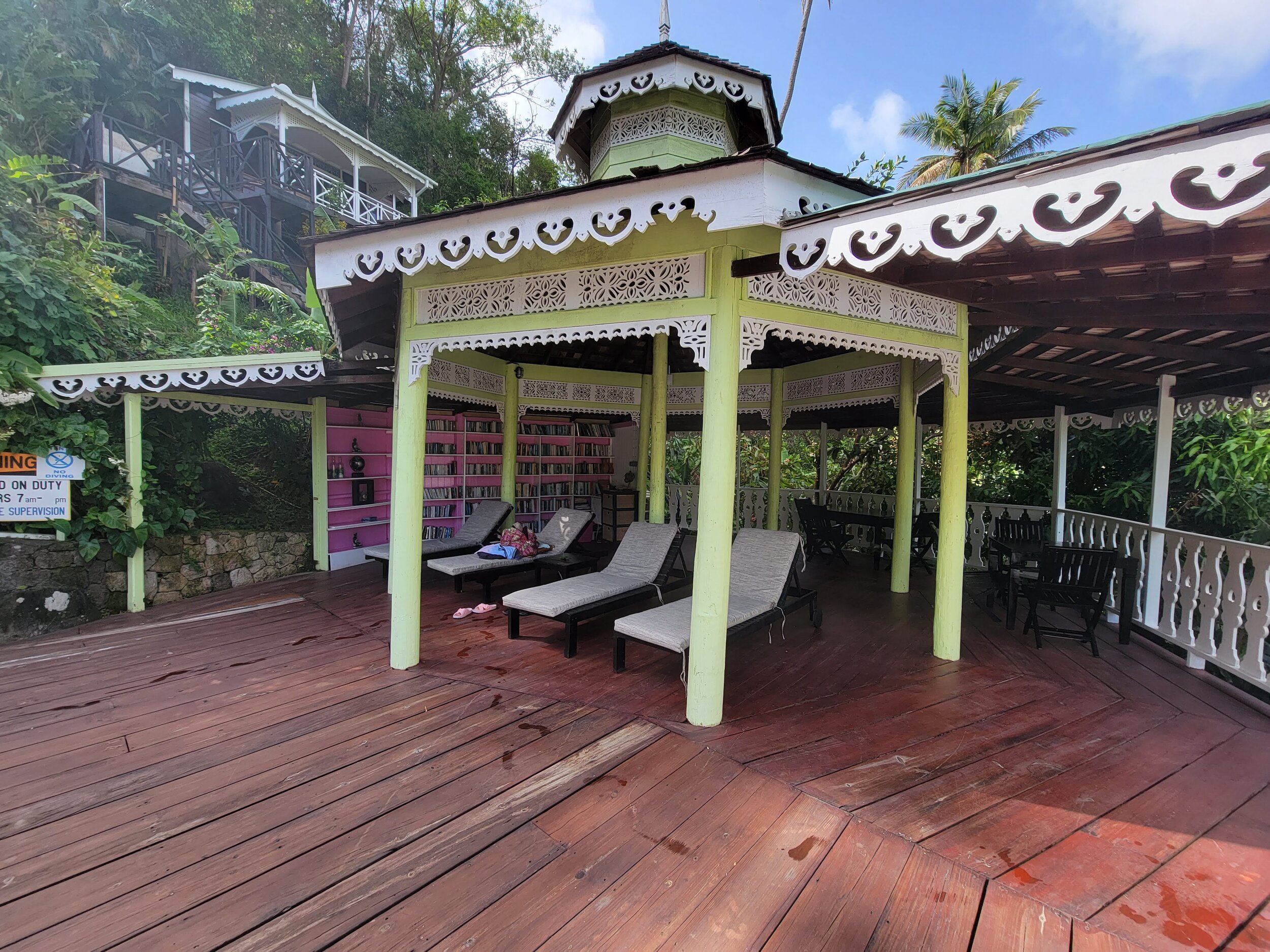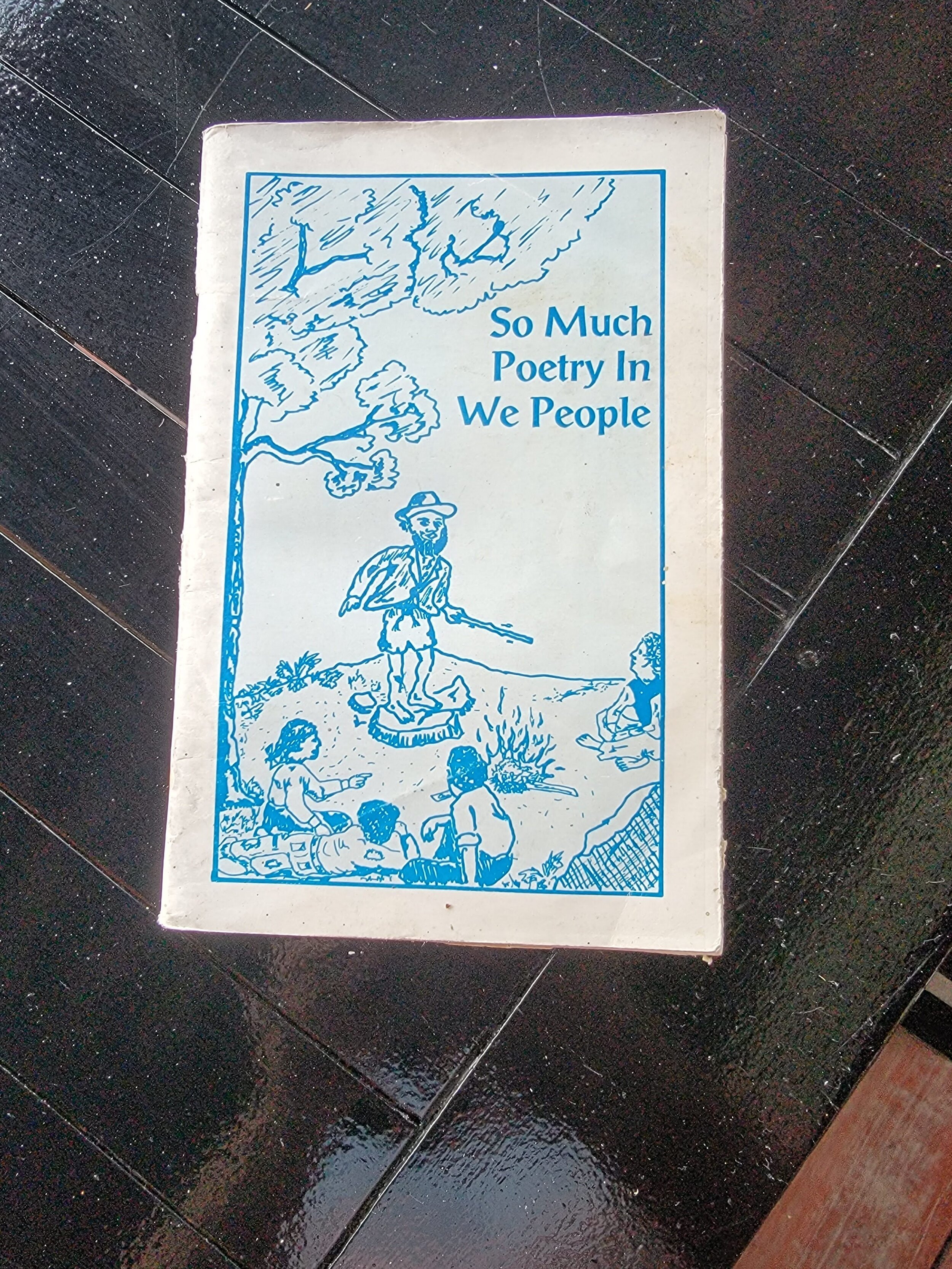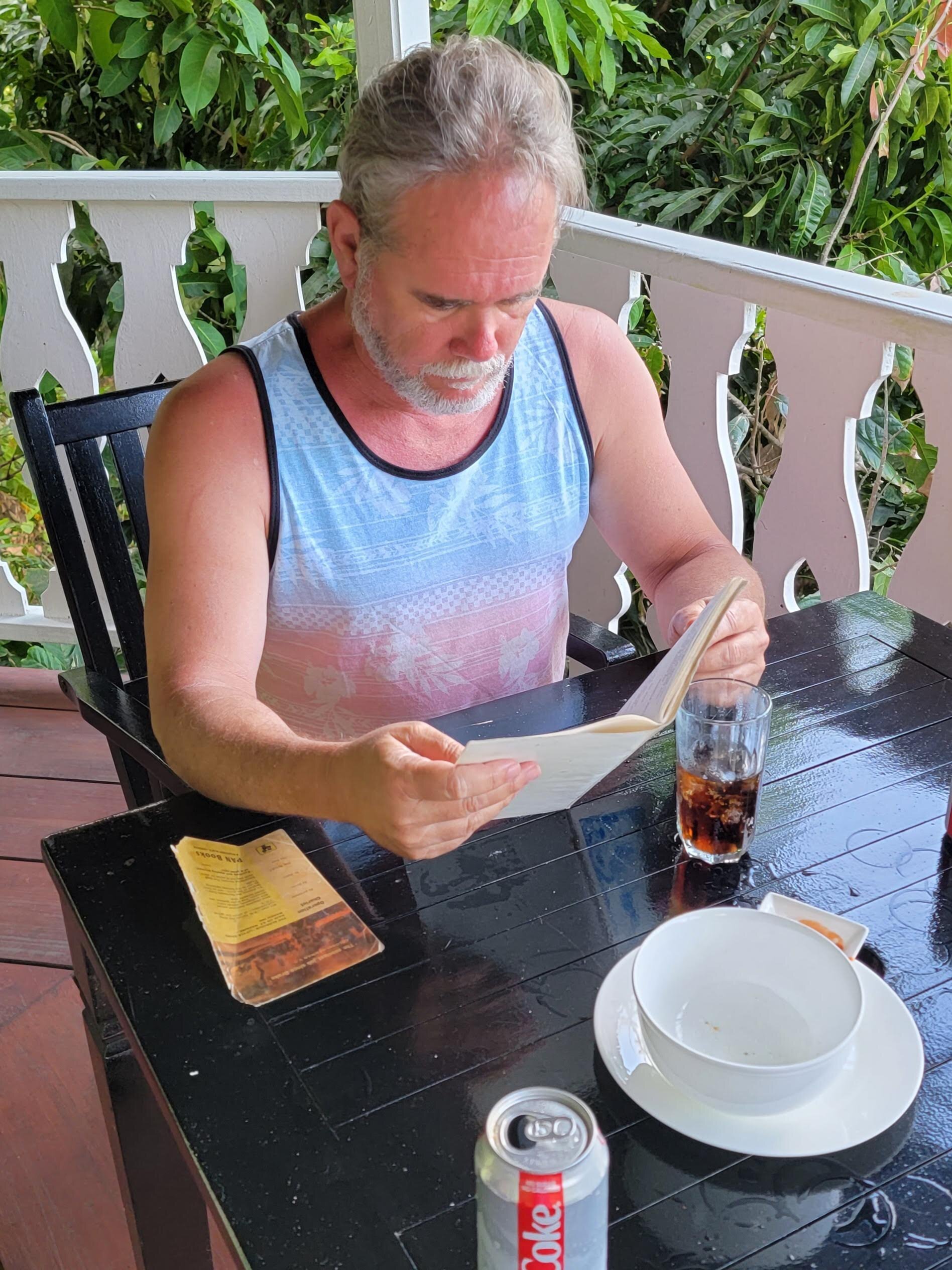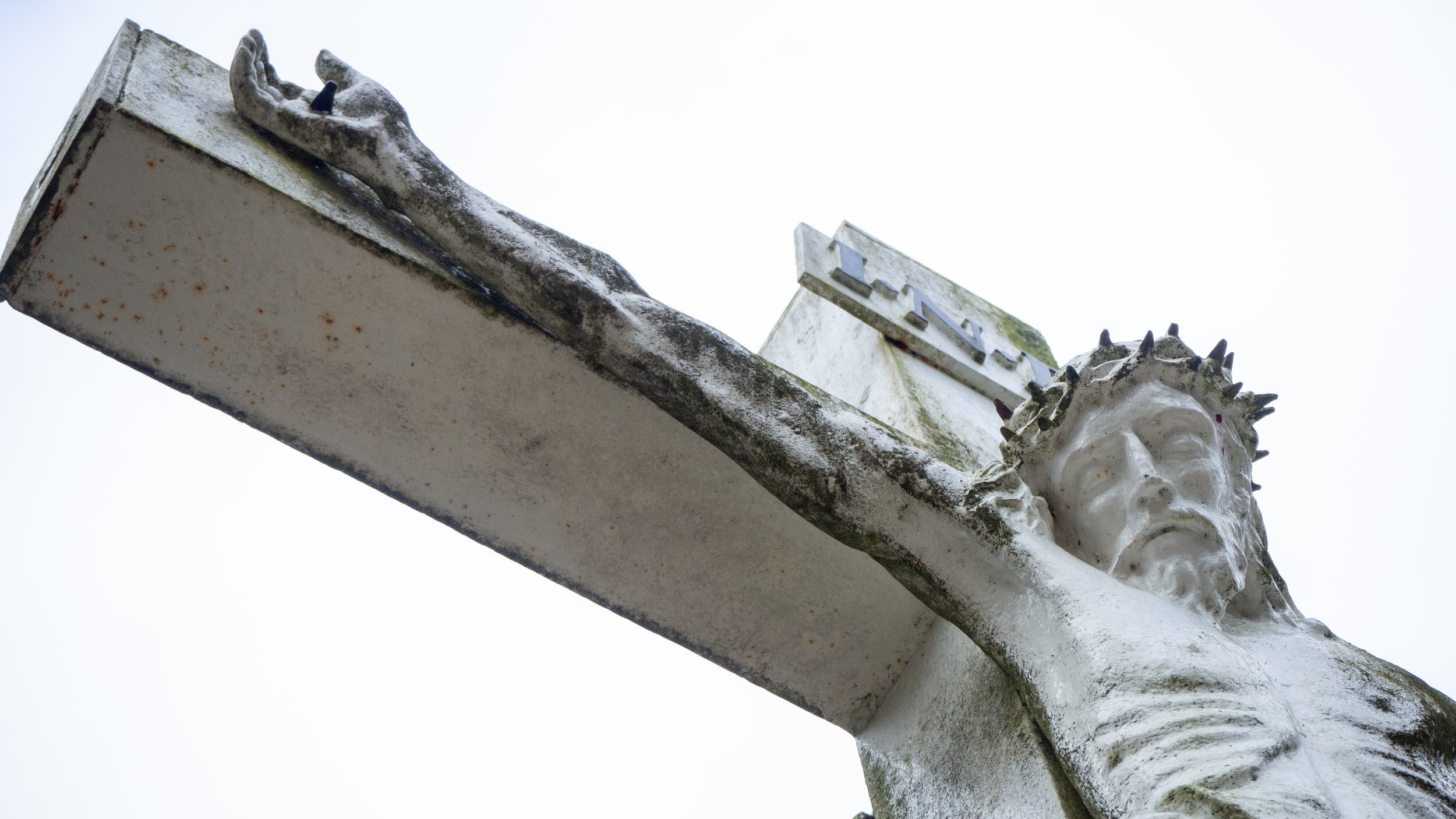“Paradise is more than a place it is also a time, a circumstance, a culture, soaked in sweat, bathed in blood, beautiful and brutal. Mostly, the wind whispers the island’s beauty secrets. Occasionally, it howls its pain.”
An island greeting
Bonjour! Non mwen se Albertina. Byenveni nan St. Luci. Byenveni nan Paradi.
Albertina, a member of Fond Doux Plantation and Resort’s amazing staff, and a favorite of ours, shared with me this greeting in the vernacular language of the Island locals, Kw¨y³l (Creole). The language is a hybrid of African syntax and French vocabulary. It emerged over time, partially as a mechanism for African slaves to communicate in a language all their own, and not completely understood by their French and then English masters.
Interpretation: Hello, my name is Albertina. Welcome to St. Lucia. Welcome to Paradise.
Albertina was not the first to welcome us to Paradise. She was maybe the fourth or fifth. First, the taxi driver transporting us from the meager airport to our plantation destination. The smiling man, a proud St. Lucia citizen and Paradise apologist drove us there on narrow roads that serpentine through luscious green jungle past sleepy villages, a staked out donkey and the odd goat, grazing roadside. Because St. Lucia is most heavily influenced by the British, the driver sits on the wrong side of the vehicle, which is to say the right side, and drives on the wrong side of the road, which is, of course, the left side.
The disorientation associated with this fact combined with my delicate constitution when it comes to motion sickness (especially when riding in the back seat) meant I would take an hour or so to get over the ride and fail to completely appreciate at that moment the experience. This did not prevent me asking questions and receiving a brief history of St. Lucia from the kind man, navigating the hairpin curves, and narrowly missing every oncoming vehicle.
A brief history of Paradise
I learned that St. Lucia was first colonized by the French. They also brought the first African slaves to the island. However, The French were not the first to discover the island. The Arawak Indians did that in 200 AD. In 800 AD, the Carib Indians, resourceful and fierce pioneer warriors, took possession of the island and proved a significant obstacle to colonization when the French, English, and Dutch attempted to take the island to further enhance their global trade and expansion aspirations. The island was first colonized by a pirate. (Pirates played a key and colorful role in the history of the island.) Francois Le Clerc, aka Peg-Leg Le Clerc, used the offshoot Pigeon Island to attack Spanish merchant ships in the 1550s.
The Dutch tried to build a fort there, but the Caribs sent them packing. The British sent 400 settlers in the 1600s, but they were wiped out in a matter of months by the Caribs. In 1651, the French West India Company purchased the island from the Caribs and established a French colony. The English responded by sending 1,000 men to retake the island. The island would be alternately owned by the French and English – seven times each – until the French ceded the island in a treaty in 1814.
Today, St. Lucia is an independent nation but a member of the British Commonwealth. English is the official language, but the native Creole is the vernacular.
You know how it feels when you are with people who speak a different language and they start doing that around you, sometimes looking at you with a giggle or a wry smile and you wonder just what vile or demeaning things they are saying about you? Well, I never once got that feeling in St Lucia. I heard plenty of Creole, but it seemed nothing but natural and unoffensive. In fact, not one thing on the entire journey felt anything less than warm, genuine, and accommodating.
Paradise is more than a place
Paradise is more than a place “ it is also a time, a circumstance, a culture, soaked in sweat, bathed in blood, beautiful and brutal. Mostly, the wind whispers the island’s beauty secrets. Occasionally, it howls its pain.
Fond Doux Plantation and Resort is owned by a native couple, Lyton and Eroline, and has been passed down in the same family for generations . Their commitment to its history, traditions, and to hospitality is evident in every smiling staff member face, every No problem, Mon, answer to the guests request, and the ceaseless work of the tireless workers. The place is rife with banana trees, coconut trees, mango trees, and fruits and vegetables of innumerable varieties, not to mention the incredibly gorgeous Flamboyant tree. It is a paradise carved out of a jungle, cultivated and conquered through centuries of back-breaking labor. Fond Doux Plantation is 279 years old, established in 1742, when America herself was still a British Colony. The resort proudly identifies as an Eco-Resort, having resisted the temptation to destroy the landscape in favor of building a large, modern facility. Consequently, for the couples looking to disconnect, go off the grid, and find themselves in the peace and tranquility of Nature, it is hailed as one of the finest Caribbean destinations. There are only 16 cabins there, so overcrowding is never a problem. If you like, you can even form friendships with like-minded guests.
We did.
There is no question St. Lucia and Fond Doux enjoy qualities of beauty, peace, and tranquility we associate with Paradise. But timing and circumstance play indispensable roles in that equation.
One of my favorite features of Fond Doux was the poolside library, populated with books as widely varied as literature itself, some put there by the proprietors, some by the staff, and some left by guests. The book I landed on impacted my mindset and appreciation for the island paradise I was enjoying. The book is So Much Poetry in We People: An Anthology of Performance Poetry. It was published in 1990 by the Eastern Caribbean Popular Theatre Organization. The poems, some sung, some chanted, some delivered as monologues, reflect the plight of the African slaves forcibly removed from their native land and transported to Caribbean islands to provide labor in their colonization.
They are heart-rending, sobering reminders that the price of Paradise is much more than the cost of an all-inclusive cruise or airline tickets, accommodations, food, and tips. Way, way more than that.
I could scarcely make it past the first two poems in the book
“The captain say to lessen the load
They ship olverload, throw them overboard
I yah yah, Oh yoh yoh!
Packed like live sardines in tins
A stinking scene
Little air to breathe in
Just imagine
You ent like
Can’t fight against it
Everyone living in distress
No one knows who is next
And the sharks waiting in the ocean
To feast on the blackman
The captain say to lessen the load
They ship olverload, throw them overboard
I yah yah, Oh yoh yoh!
Children vomiting
Men suffocating
Women bawling, shackles squeezing
The ship continue sailing
No one attending to the dying
Captain have no love
Just lessen the load, the ship overload
Throw them overboard
The captain say to lessen the load
They ship olverload, throw them overboard
I yah yah, Oh yoh yoh!”
Imagine I am poolside in my newfound Paradise, enjoying the summer sun, the gentle breeze, the singing birds, the swaying trees, mere feet from the crystal-clear pool from which I have just emerged, and I find this book.
Wow, this was written by Caribbean poets, a local production, I say to aloud to myself, I bet it is interesting.
The horror and stark reality of the plight of many of the island’s ancestors slash through my serenity and rip into my relaxation. Anger boils inside me at the inhumanity, the evil that men do to one another. Tears stream uninvited, unrelenting.
The second poem in the little book is titled Free Up Yuh Self by Winston Ferrel
“Rip we way from we lan
Make we wuk fuh white man
Rip we way from we civilization
Make we wuk a damn plantation
De African no longer know himself
De African no longer know himself
Came fuh we in a ship at night
Packin we rough an packin’we tight
Leavin half o’we behind
Before dem get to where dem gwine
Free up yuh self brother African
Free up yuh self now (repeat)
De African no longer know himself
De African no longer know himself
Put him in Barbados
Him a Bajan
Put him in Jamaica
Him Jamaican
Put him in England
Him an Englishman
Put him in America
God damn Yankee man
Black man struggle through the years
Oppressed with the burden and the fears
White whip rules his head
Shackled soul makes him ah dead
De African no longer know himself
De African no longer know himself”
The words with which I opened this piece and this section bubble up. I say them aloud to myself and then write them into a note on my phone
Paradise is more than a place it is also a time, a circumstance, a culture, soaked in sweat, bathed in blood, beautiful and brutal. Mostly, the wind whispers the island’s beauty secrets. Occasionally, it howls its pain.
Then the title forms
At what price Paradise?
If one St. Lucian said to me, Welcome to Paradise, at least a dozen did. But Paradise is a matter of timing, as well as location. Just days before we landed in St. Lucia, Hurricane Elsa, which fizzled before coming ashore in America, tore through St. Lucia with 100 mph winds. Across the landscape, felled and uprooted trees interrupted our view of Paradise.
The hurricane was just the most recent reminder of the price of Paradise. The little poetry book was the first.
Slavery was abolished on the island by the British in 1814. Fond Doux Plantation predates that by 72 years. I was unable to ascertain who first owned the plantation or whether it was ever worked by slaves, but you have to think probably it was.
Hurricanes and slave ships reminded me that Paradise is a matter of timing and it is not free of trouble and cost.
Paradise on two wheels
My Dad said many things that I remember. Most were not necessarily original quotes but when he put his touch on one, it felt like no one had ever said it before and certainly none better. One of the things he said to me on a number of occasions was this: Son, nothing is free and the good stuff costs a little more.
I was eleven years old the first time he said that to me. I had my eye on a new bicycle. I wanted it bad and he wanted me to have it, but Dad was old school. He felt that if you earned a thing, you would cherish it more. Besides, I was cheap labor and was already helping out in his auto repair shop, D&F Battery and Electric, the place he and Mom owned and operated. I worked on the rebuilt battery part. Dad bought junk batteries around town from places like Sears and gas stations and such, the exchange batteries, the ones people yielded when they bought a new battery. The ones he could re-acidize and put on a line charger and give new life to, he painted black, or rather I did and sold them as rebuilt batteries. They came with a 90-day warranty. That stinking backroom with the acrid smell of battery acid pungent in my nostrils was where I learned the value of a dollar. On payday, Dad would pay me cash – usually $20 or so – which was big money to an 11-year-old in 1972.
I saved my salary for weeks to pay off the beautiful, sporty 10-speed bike I had placed on layaway. When it was mine, so was Mineral Wells. I owned that town. I could fly down its streets in utter freedom with my friends. That bike was my mobile Paradise for several years. I cherished it because I paid for it with my sweat and aching muscles while other kids my age rode their bikes to the community pool or to the baseball diamond or some adventure. I began my transition to manhood a little early and that conversation with Dad initiated it.
Jesus and Paradise
I see Jesus, naked, beaten, bloody, face marred beyond recognition, lustily mocked by a frenzied crowd, and looked upon with satisfaction by his mortal enemies, the religious establishment. He is near the end of his earthly journey, on Death’s doorstep, when a fellow criminalacknowledges His deity. Sure, it is a deathbed conversion, which so many hold in little regard, but the man cries a plea for mercy and expresses a newfound faith in Someone, who is unlike anyone he had ever encountered.
Lord, he cries, remember me when you get to your kingdom.
Jesus answers, This day, you will be with me in Paradise.
At what price, this Paradise? The ugly skull-shaped hill they named Golgotha, The Place of the Skull, is the ticket gate, the place and the price of admission for that dying thief and every professing Christian, from Adam until this very day, until time is snuffed and smoldering in the final conflict between good and evil, which is to say, God and the Devil.
When Jesus said, It is finished, He was saying Paradise was paid in full.
Whether it is a Paradise in the Caribbean or the one in the Heavens, in that other dimension where slavery in all its forms ‘ spiritual, physical, psychological “ is forever abolished, where the wind never howls, and the peace is eternal and uninterrupted, you better believe Paradise has a price tag and because it is the good stuff, it costs a little more.
But where Heaven is concerned, Jesus paid it all.
